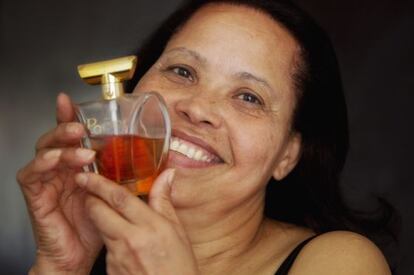"I left the best years of my life here"
After 17 years in Spain Isabel Sierra has to return to the Dominican Republic

Isabel Sierra arrived in Spain from the Dominican Republic 17 years ago. She is now aged 54, and against everything she hoped for, she has no option but to return home. "It never occured to me that I would end up like this, but I have decided. For years I used to send 400 euros home each month; that's how much I earn now looking after old people for a few hours a week. I have to pay 200 euros rent, and then the water, the gas... Living like this I might as well go home. I will take less with me than I brought. I am older, and have less chances in life now. I have left the best years of my life here."
Isabel says that for many years things went well for her. "I found work within two days. Spain made me feel very productive. I worked with elderly people, which is very satisfying, and I earned 1,500 euros a month. But here, once I passed 45 and the crisis kicked in, suddenly all the doors were closed to me." Despite having Spanish nationality, she says that she feels discriminated against. "When it comes down to it I am just a black woman, a foreigner. I did the work that Spaniards didn't want to do, just like in my country, where the Haitians do the dirty work. But now people fight for those jobs."
Unemployment among migrants is 15 percent higher than the national average, and even higher for women. And for anybody past 50, it is nigh on impossible to find work. Spain, which at one point had the highest immigration rate in the world, witnessed more than 85,000 foreigners leave last year. According to the INE statistics office, within a decade Spain's population will have shrunk, with around half a million people leaving. Many of them will be young people, further reducing the country's labor pool.
Isabel's dream was to buy a house. "But here I am, 17 years later, returning home with nothing." She says that she was able to buy some land in the Dominican Republic, but it was occupied by squatters. "But in spite of everything, I do not feel that I failed: I was able to help my family back home. I sent them money." Asked what the most expensive item in her meager suitcase is, she answers: "My perfume. It's French, and I bought it a long time ago. I couldn't afford to buy it now."
When it comes down to it I am just a black woman, a foreigner"
Tu suscripción se está usando en otro dispositivo
¿Quieres añadir otro usuario a tu suscripción?
Si continúas leyendo en este dispositivo, no se podrá leer en el otro.
FlechaTu suscripción se está usando en otro dispositivo y solo puedes acceder a EL PAÍS desde un dispositivo a la vez.
Si quieres compartir tu cuenta, cambia tu suscripción a la modalidad Premium, así podrás añadir otro usuario. Cada uno accederá con su propia cuenta de email, lo que os permitirá personalizar vuestra experiencia en EL PAÍS.
¿Tienes una suscripción de empresa? Accede aquí para contratar más cuentas.
En el caso de no saber quién está usando tu cuenta, te recomendamos cambiar tu contraseña aquí.
Si decides continuar compartiendo tu cuenta, este mensaje se mostrará en tu dispositivo y en el de la otra persona que está usando tu cuenta de forma indefinida, afectando a tu experiencia de lectura. Puedes consultar aquí los términos y condiciones de la suscripción digital.








































